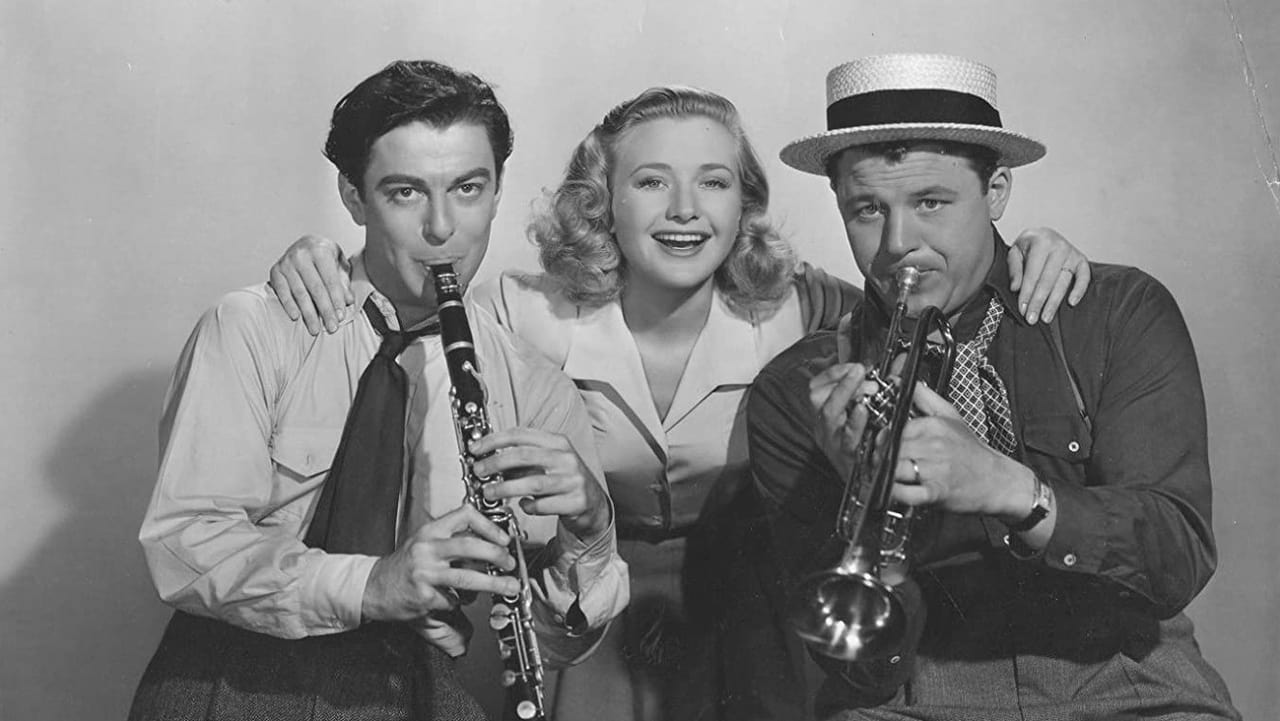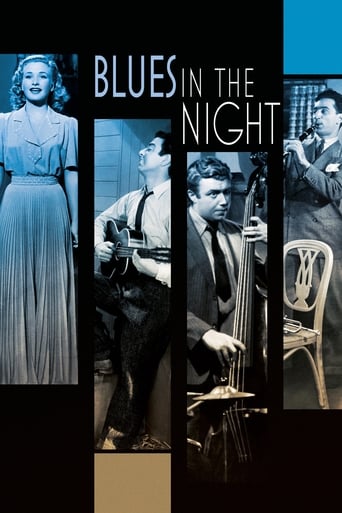

I recorded this film on spec because I was interested to see Richard Whorf in a starring role. I thought he did an excellent job but wasn't quite special enough in looks or personality to become a star. Top billed was Pricilla Lane who, by the importance of her role should have been billed about sixth. That's only the beginning of what I thought was one of the famous write it as you go WB films, like when They Drive by Night (1940) takes an unexpected turn into Bordertown (1935). It starts out as a few friends trying to form a band. Billy Hallop has a coughing fit in jail and we just know he's going to be their inspiration when he dies. Nope, he never coughs again. A brash Jack Carson shows up with his overwhelmed wife Lane. He treats here like dirt and chases after every skirt. We just know she and Whorf will get together. Nope, he falls for the dame Carson should have gotten, a no-good twist, play brilliantly by Betty Field. The band is bumming a ride in a box car when Lloyd Nolan, obviously a gangster on the run, hops aboard. The band shares their food with him. He's obviously going to do them a good turn. Nope. He robs them. But eventually Nolan sets up a nightclub and hires them. Field was his girl but Nolan is smart enough to have done with her. Here weak husband (?), Wallace Ford, fawns on her, totally dependent. He's a drunk and a gambler. We know Nolan will eventually kill him. Nope, he turns out to be quite a philosopher, taking matters into his own hands. One of his best roles. Whorf falls for Fields, becoming another Ford. He has a nervous breakdown. We know when he gets well, he'll rejoin the band, they'll become stars and it will end happily ever after. Nope, he falls for Field again. All during this the film gets darker and darker until peaking on a dark and stormy night. Finally, the band goes back to being just another band. Other reviewers claim the plot is routine but I think it deliberately sets up the plot turns to break them. Or maybe the writers just lost control. In any event, the film surprises at every turn. The acting of one and all is excellent and the dark cinematography is superb. The music is great with Whorf (or someone dubbing his playing)is really brilliant on the piano. It's a really good ensemble piece that deserves more recognition.
... View MoreThis is a rarity that deserves a much wider audience. Lots of interesting credits from Anatole Litvak who was nothing if not eclectic shooting stuff as diverse as Mayerling, The Snake Pit, Sorry, Wrong Number, Anastasia and The Deep Blue Sea. Robert Rossen who wrote the screenplay was one of three future directors involved in the project the others being Richard Whorf and Gadg who weighs in with a frenetic acting performance. Harold Arlen and Johnny Mercer provided two all-time great standards though neither one, This Time The Dream's On Me and the title song gets a workout worthy of them. The cast is a movie buff's dream with the likes of Howard da Sylva, Betty Field, Lloyd Nolan, Prisscilla Lane and Jack Carson all emoting for local 802. There's a certain melodramatic element which does no harm and tends to move the whole thing to the outskirts of noir. Catch it if you can.
... View MoreIt's hard to decide which is the most awkward part of this slightly noirish movie...the beginning, the middle or the end. The beginning features five white musicians and a girl singer who decide to form a special kind of band, led by the impassioned piano player. "It's gotta be our kind of music, our kind of band...the blues, the real blues...the kind that comes out of people, real people...their hopes and their dreams...." The middle features these six riding a box car, becoming entangled with a rough gangster who befriends them, a tough- as-nails femme fatale who does not, and a roadhouse success in New Jersey. The end features a nervous breakdown, a dead baby, a shooting, a car ride to death and another box car. You know, the usual blues stuff. Along the way there is some impassioned dialogue. What Blues in the Night has going for it are songs by Harold Arlen and Johnny Mercer, including one great song, "This Time the Dreams on Me" and one they knocked out of the ball park, perhaps the best popular blues song ever written, "Blues in the Night." The movie also features another first-rate performance by Lloyd Nolan as the gangster. I wonder if any other actor appeared in so many flawed A movies or just plain B moves but who invariably gave believable, notable performances. There are several musical numbers that stand out. We also have the chance to see Betty Field, a first-rate actress who wasn't as successful in Hollywood as she was on Broadway. She plays the femme fatale, complete with bad grammar and the kind of sexy selfishness that can lead a man to bed at night and leave him alone with an empty wallet the next morning. She's brittle and hard here, but her strong suit as an actress, I think, was the fragile vulnerability and warmth she could project. After her role in this movie, the next year she played the doomed Cassie in Kings Row, two performances as different as a prostitute's embrace is from a tremulous first kiss. The movie also has the curiosity value of featuring Elia Kazan in his last acting role. He plays the band's hyperactive young clarinetist whose mother wants him to be a lawyer. Kazan and the film's screenwriter, Robert Rossen, both were hauled before the House Un-American Activities Committee during the Hollywood witch-hunts. Both named lots of names. While those they named saw their careers crushed, Kazan and Rossen prospered. Would I have done it differently? I don't know. What little reason there is to remember this movie, however, is the great Arlen/Mercer song: My mama done tol' me, when I was in knee-pants, My mama done tol' me, "Son, a woman'll sweet talk And give you the big eye, but when the sweet talking's done, A woman's a two-face, a worrisome thing who'll leave you to sing the blues in the night." Anyone who doesn't believe Mercer's words are true American poetry...well, you should also throw out the works of William Carlos Williams. For Mercer fans, you might be interested in the CD An Evening With Johnny Mercer. Before an audience (which included Harold Arlen) he explains a bit about his writing, takes us through his career and breezes through a number of his songs. It was recorded in 1971, five years before he died. The drawback is that it runs less than an hour. For Mercer fans, it's essential. Mercer usually was his own best interpreter, but Bobby Troupe does a nice job with Bobby Troupe Sings Johnny Mercer. Troupe swings it and keeps it intimate. There's none of the over-orchestrating and lushness that some otherwise great singers brought to Mercer's songs. The CD is hard to find. Easier to locate is The Songs of Johnny Mercer sung by Susannah McCorkle, a fine, low-key stylist. If I've given the impression you should forget this movie and instead spend more time listening to Johnny Mercer...you'd be right.
... View MoreThis movie was a bit unusual because it starts off strictly like a musical the first 20 minutes. It had me puzzled; I didn't think I had rented a musical. Well, it wasn't, as it turned out, even though music was a central element in the story. The rest of the film was a combination of drama, film noir and melodrama. At least that's the way I saw it and, yeah, I was glad to see IMDb confirm my description when I got to the title page here to post the review.The only time the movie bogged down was when it became a little too melodramatic in a few spots. Betty Field ("Kay" )was usually in those scenes, playing a woman with a chip on her shoulder. As I watched her, I thought, "Wow, this woman is tailor-made for film noirs. She could have been another Marie Windsor." Sadly, she wasn't, but she was in a good number of movie and television shows. Still, I think noir would have been the best vehicle for her.Priscilla Lane plays the female opposite: the wholesome-looking good gal ("Character") who just wants the band to click and for everybody to be happy. Heck, that's what the band in general wants, but "Jigger" is the guy who keeps putting a monkey-wrench into the deal and seems to be the band member whom everyone looks to for leadership.Richard Worf plays "Jigger," and he's so-so as an actor. The fact he never made it big is understandable. There's a smoothness to his delivery that's missing. His changed his career from acting to directing in 1945 and did better at that. Obviously the same can be said for another member of the band in this story: "Nickie," played by Elia Kazan, who classic film fans know as a very famous director.When all is said-and-done, actors Lane and Lloyd Nolan ("Del") seemed to be the most "real" in this film, and those two were the ones who had the best careers of this cast, particularly Nolan. Jack Carson and Howard da Silva are also in this movie and they're "known" actors, too.My favorite part of the movie was a very short scene with about 15 minutes left with "Jigger" was in the hospital and he was hallucinating. The innovative camera-work was terrific, right out of Dali painting. Kudos to director Anatole Litvak for some good closeup shots and interesting camera angles and use of light, in that scene and others in the film. This movie is very well photographed. Ernie Haller was the cinematographer. Haller's resume includes some very famous films.The odd mix of genres makes this intriguing movie I'm glad I checked out, and I recommended to fellow classic film fans.
... View More